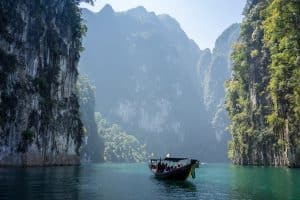Over the past few decades, sustainable tourism has emerged as a significant global industry. It intertwines the essence of economic growth, environmental sustainability, and social-cultural aspects of various destinations. This article aims to delve into the intricate role of sustainable tourism in fostering economic development. We’ll also assess how its strategies align with the broader goals of sustainability and its impacts on the environment and local communities.
Dans le meme genre : The power of storytelling in corporate communication
The Emergence of Sustainable Tourism
In the ever-evolving world of travel and tourism, sustainability has risen from being a mere buzzword to a key driver in the industry. Google Scholar and Crossref are teeming with research that emphasizes the importance of sustainable tourism. This section provides an overview of how sustainable tourism has carved out its niche within the global travel sector.
Sustainable tourism focuses on reducing the negative impacts of travel, while maximizing the benefits for the environment, local communities, and travelers. It encourages responsible tourism practices that cater to economic growth and environmental preservation simultaneously. For example, eco-lodge accommodations and carbon offset programs are practical implementations of sustainable tourism.
A lire également : Sustainable business practices: balancing profit and planet
Economic Impacts of Sustainable Tourism
It’s undeniable that tourism is a powerful economic force. However, the real question lies in how sustainable tourism influences economic development. This section will elucidate how the principles of sustainable tourism align with economic growth.
As a sector, tourism stimulates economic growth by generating income, creating jobs, and attracting investments. When these aspects are coupled with sustainability, long-term economic development is achieved. For instance, sustainable tourism encourages the use of local products and services, thereby enhancing local economies. It also promotes the development of sustainable infrastructures, which can serve as catalysts for further economic activities.
Sustainable Tourism and Local Development
One of the most compelling aspects of sustainable tourism is its ability to support and empower local communities. This section explores how sustainable tourism contributes to local development.
By engaging the local community in tourism activities, sustainable tourism ensures that the benefits of tourism are shared among the local population. It supports the preservation of local traditions and cultures, thereby fostering a sense of pride and identity among locals. Moreover, sustainable tourism’s emphasis on local empowerment and capacity building can lead to social development and reduced poverty levels.
Environmental Sustainability: The Bedrock of Sustainable Tourism
Environmental sustainability is an integral part of sustainable tourism. This section focuses on how sustainable tourism works towards the conservation and preservation of the environment.
Sustainable tourism acknowledges that the environment is a vital asset for tourism. Therefore, it strives to minimize the negative environmental impacts of tourism activities. This involves promoting environmentally-friendly practices among tourists and tourism operators, conserving natural and cultural heritage sites, and working towards climate change mitigation and adaptation. In essence, the environmental sustainability aspect of sustainable tourism ensures that the beauty and diversity of our planet can be enjoyed by future generations.
Cultural Implications of Sustainable Tourism
Tourism can have profound impacts on the host culture, both positive and negative. This section throws light on how sustainable tourism navigates cultural aspects in tourism destinations.
Sustainable tourism encourages respect for different cultures and traditions. It fosters cultural exchange and understanding, thereby promoting peace and goodwill among nations. At the same time, it recognizes the need to preserve and protect cultural resources. This involves ensuring that tourism does not lead to the erosion or commodification of local cultures and traditions.
As we move forward, the role of sustainable tourism in economic development will undoubtedly continue to evolve. However, it’s clear that sustainable tourism will remain a key player in the global economy, driving growth while ensuring the preservation of our planet and its diverse cultures.
Sustainable Tourism: A Catalyst for Job Creation and Income Generation
One of the primary economic advantages of sustainable tourism is its potential to create jobs and generate income. This section will explore these economic benefits in more detail.
Sustainable tourism creates employment opportunities not just in the tourism sector but also in related industries like agriculture and manufacturing. By promoting local products and services, it provides a stable income source for local communities which in turn reduces the levels of poverty and boosts economic growth. A study by Google Scholar shows that in developing countries, sustainable tourism has played a significant role in job creation and boosting local economies.
Moreover, sustainable tourism stimulates investment in local businesses which can lead to further job creation. It also encourages entrepreneurial activities among locals by providing them with the opportunity to showcase their products and services to a wider market.
The economic benefits of sustainable tourism are not only confined to the local level but also contribute to national economies. The revenue generated from tourism can be used to fund public services and infrastructure development, thereby stimulating further economic growth.
The Role of Sustainable Tourism in Achieving Sustainable Development Goals
Sustainable tourism aligns perfectly with the United Nations’ Sustainable Development Goals (SDGs). This section will delve into how sustainable tourism contributes to achieving these global goals.
The SDGs, adopted by all United Nations Member States in 2015, provide a blueprint for peace and prosperity for people and the planet, now and into the future. Sustainable tourism contributes to many of these SDGs, including decent work and economic growth, industry, innovation and infrastructure, sustainable cities and communities, and responsible consumption and production.
By fostering economic growth and job creation, sustainable tourism contributes to SDG 8: Decent Work and Economic Growth. Additionally, by promoting local products and services, it supports SDG 9: Industry, Innovation, and Infrastructure.
Sustainable tourism also plays a significant role in achieving SDG 11: Sustainable Cities and Communities. It encourages the development of sustainable infrastructure and promotes inclusive and sustainable urbanization. Moreover, by advocating for sustainable consumption and production patterns, it contributes to SDG 12: Responsible Consumption and Production.
Conclusion
The role of sustainable tourism in economic development cannot be overstated. As a potent catalyst for job creation, income generation, and investment, sustainable tourism significantly contributes to economic growth at both local and national levels. Moreover, sustainable tourism aligns with the broader goals of sustainable development, making it a critical tool in achieving the United Nations’ Sustainable Development Goals.
However, to fully realize its potential, it’s vital that all stakeholders – from governments to tourism operators to tourists themselves – are committed to the principles of sustainable tourism. This involves not only adopting sustainable practices but also fostering a culture of sustainability that extends beyond the tourism industry.
With the increasing recognition of the importance of sustainability in all sectors, the future of sustainable tourism looks promising. As we continue to travel and explore the world, we should strive to do so in a way that benefits not just ourselves, but also the planet and the communities we visit. As we forge ahead, it’s clear that sustainable tourism is not just a subset of the tourism sector; it’s the way forward for the entire industry.







